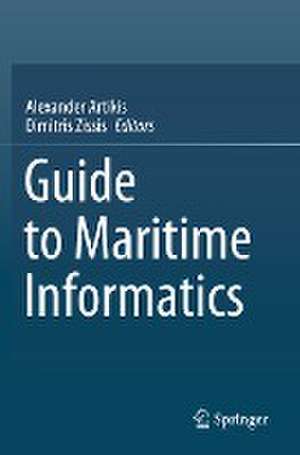Guide to Maritime Informatics
Editat de Alexander Artikis, Dimitris Zissisen Limba Engleză Paperback – 10 feb 2022
In the last 25 years, information systems have had a disruptive effect on society and business. Up until recently though, the majority of passengers and goods were transported by sea in many ways similar to the way they were at the turn of the previous century. Gradually, advanced information technologies are being introduced, in an attempt to make shipping safer, greener, more efficient, and transparent. The emerging field of Maritime Informatics studies the application of information technology and information systems to maritime transportation.
Maritime Informatics can be considered as both a field of study and domain of application. As an application domain, it is the outlet of innovations originating from data science and artificial intelligence; as a field of study, it is positioned between computer science and marine engineering. This new field’s complexity lies within this duality because it is faced with disciplinary barriers yet demands a systemic, transdisciplinary approach. At present, there is a growing body of knowledge that remains undocumented in a single source or textbook designed to assist students and practitioners.
This highly useful textbook/reference starts by introducing required knowledge, algorithmic approaches, and technical details, before presenting real-world applications. The aim is to present interested audiences with an overview of the main technological innovations having a disruptive effect on the maritime industry, as well as to discuss principal ideas, methods of operation and applications, and future developments. The material in this unique volume provides requisite core knowledge for undergraduate or postgraduate students, employing an analytical approach with numerous real-world examples and case studies.
| Toate formatele și edițiile | Preț | Express |
|---|---|---|
| Paperback (1) | 477.49 lei 6-8 săpt. | |
| Springer International Publishing – 10 feb 2022 | 477.49 lei 6-8 săpt. | |
| Hardback (1) | 537.18 lei 38-44 zile | |
| Springer International Publishing – 9 feb 2021 | 537.18 lei 38-44 zile |
Preț: 477.49 lei
Preț vechi: 596.86 lei
-20% Nou
Puncte Express: 716
Preț estimativ în valută:
91.38€ • 95.05$ • 75.44£
91.38€ • 95.05$ • 75.44£
Carte tipărită la comandă
Livrare economică 14-28 aprilie
Preluare comenzi: 021 569.72.76
Specificații
ISBN-13: 9783030618544
ISBN-10: 3030618544
Pagini: 333
Ilustrații: XV, 333 p. 114 illus., 111 illus. in color.
Dimensiuni: 155 x 235 mm
Greutate: 0.49 kg
Ediția:1st ed. 2021
Editura: Springer International Publishing
Colecția Springer
Locul publicării:Cham, Switzerland
ISBN-10: 3030618544
Pagini: 333
Ilustrații: XV, 333 p. 114 illus., 111 illus. in color.
Dimensiuni: 155 x 235 mm
Greutate: 0.49 kg
Ediția:1st ed. 2021
Editura: Springer International Publishing
Colecția Springer
Locul publicării:Cham, Switzerland
Cuprins
Maritime Reporting Systems.- Navigating the Ocean of Publicly Available Maritime Data.- Maritime Data Processing in Relational Databases.- Maritime Data Analytics.- Visual Analytics of Vessel Movement.- Online Mobility Tracking against Evolving Maritime Trajectories.- Link Discovery for Maritime Monitoring.- Composite Maritime Event Recognition.- Uncertainty handling for maritime route deviation.- Maritime network analysis: connectivity and spatial distribution.- Shipping economics and analytics.
Notă biografică
Alexander Artikis is an Assistant Professor at the University of Piraeus and a Research Associate at the National Centre for Scientific Research (NCSR) “Demokritos”. His research interests lie in the fields of Artificial Intelligence and Data Science.
Dimitrios Zissis is Associate Professor at the Department of Product and Systems Design Engineering, University of the Aegean, Syros, Greece.
Textul de pe ultima copertă
In the last 25 years, information systems have had a disruptive effect on society and business. Up until recently though, the majority of passengers and goods were transported by sea in many ways similar to the way they were at the turn of the previous century. Gradually, advanced information technologies are being introduced, in an attempt to make shipping safer, greener, more efficient, and transparent. The emerging field of Maritime Informatics studies the application of information technology and information systems to maritime transportation.
Maritime Informatics can be considered as both a field of study and domain of application. As an application domain, it is the outlet of innovations originating from data science and artificial intelligence; as a field of study, it is positioned between computer science and marine engineering. This new field’s complexity lies within this duality because it is faced with disciplinary barriers yet demands a systemic, transdisciplinary approach. At present, there is a growing body of knowledge that remains undocumented in a single source or textbook designed to assist students and practitioners.
This highly useful textbook/reference starts by introducing required knowledge, algorithmic approaches, and technical details, before presenting real-world applications. The aim is to present interested audiences with an overview of the main technological innovations having a disruptive effect on the maritime industry, as well as to discuss principal ideas, methods of operation and applications, and future developments. The material in this unique volume provides requisite core knowledge for undergraduate or postgraduate students, employing an analytical approach with numerous real-world examples and case studies.
Caracteristici
This unique volume formalises a body of knowledge for the emerging field of maritime informatics Examines the use of information technology and information systems in maritime transportation An overview of the main technological innovations which are having a disruptive effect on the maritime industry
